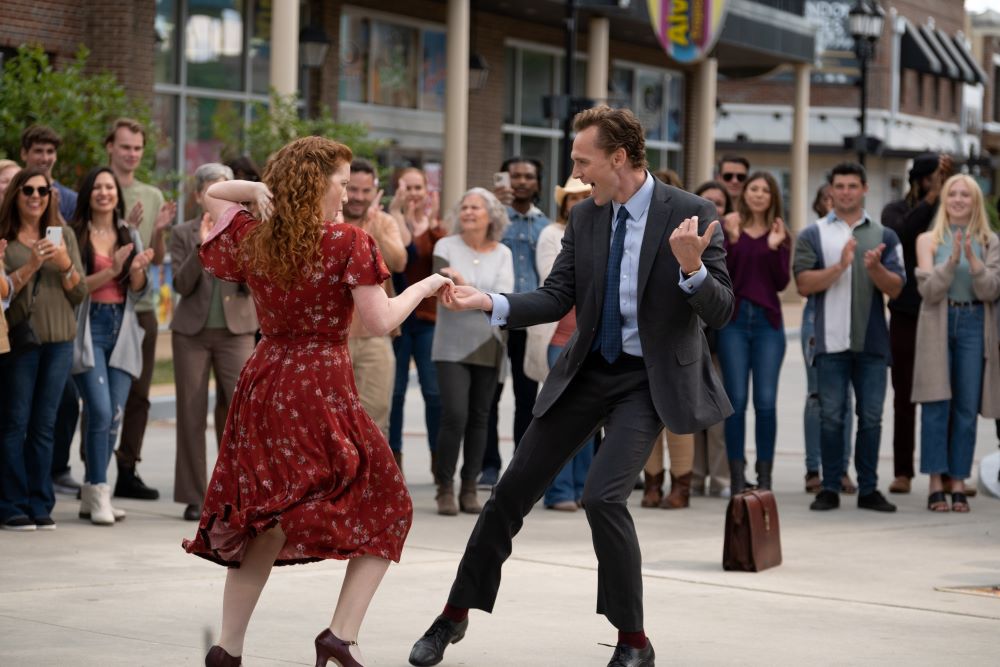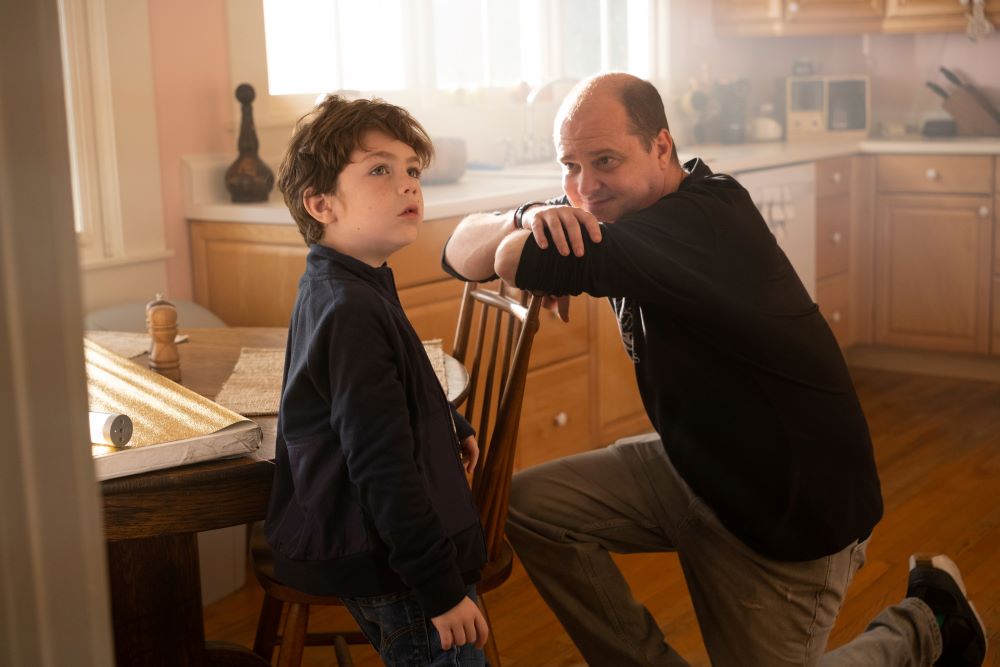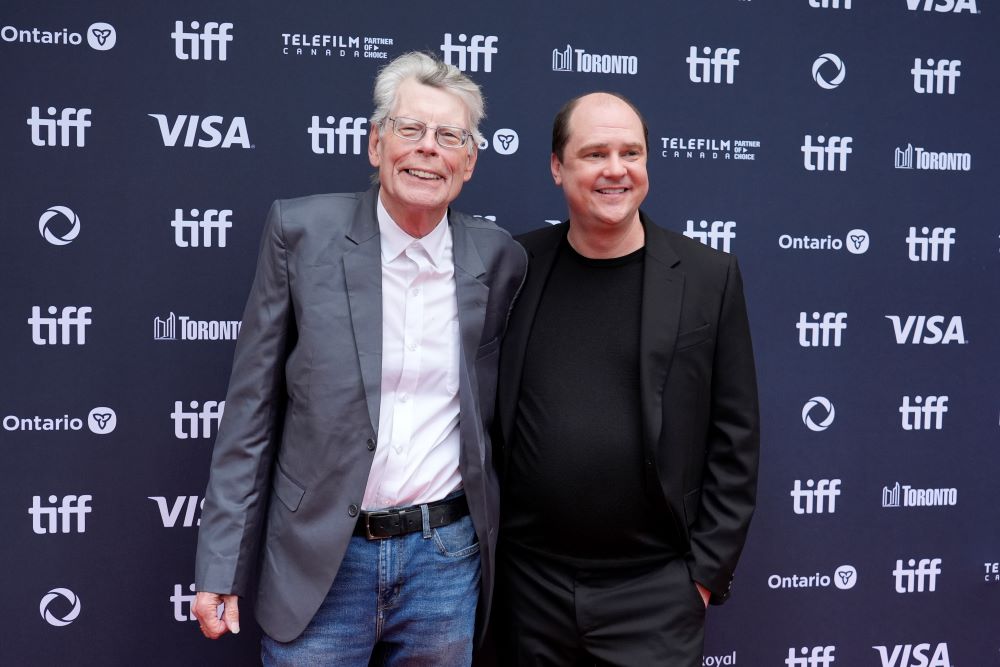
"The Life of Chuck," Mike Flanagan's newest adaptation of a Stephen King work, opens in movie theaters nationwide June 13. The meaning of King's work goes far beyond horror, Flanagan says. (NEON/Jennifer Nguyen)
The first half hour of "The Life of Chuck" may go down as one of the scariest in film, and yet there is no supernatural monster, no violence, no cleverly edited jump scares. What is so frightening is the collapse of human civilization before an ever-escalating series of world climate disasters — and the undeniable believability of it all.
There is a reason for the brilliance of the horror: the extraordinary three-chapter film from writer/director Mike Flanagan is an adaptation of a three-part novella of the same name by Stephen King. But what follows in the second and third chapters are time jumps backward to seemingly completely different kinds of tales about an accountant named Chuck Krantz (played as an adult by Tom Hiddleston and later as a young person by Jacob Tremblay, Benjamin Pajak and Cody Flanagan). Chuck's journey — which will involve a street drummer, Carl Sagan and the greatest soliloquy about mathematics that any of us will ever hear — will transform everything we've seen into a profoundly moving meditation on the beauty of being alive. It's a glorious, must-see film.
"The Life of Chuck" won the 2024 People's Choice Award at the Toronto International Film Festival. It opens in theaters nationwide June 13.
'The magic of the small moments in our lives will become the brightest stars in our memories in the last hours.'
—Tom Hiddleston
Flanagan and his incredibly capable cast take us by the hand and lead us without revealing too much about where we're going from chapter to chapter, or how exactly they connect. "We all live every day in the uncertainty" of not knowing where our lives are going or how they will end, Hiddleston shared in a cast conversation with press attended by the National Catholic Reporter. "And the magic of the small moments in our lives will become the brightest stars in our memories in the last hours."
Flanagan proves to be the right person to trust on this journey. For all his success as a novelist, King's work has proven over the years to be the Scylla and Charybdis of filmmaking, with most adaptations foundering on the rocks despite great casts and creative teams. But in recent years Flanagan — who is also the creator of a number of other films and well-received limited series, including "The Haunting of Hill House," "Fall of the House of Usher" and the extraordinary "Midnight Mass" — has proven to be the steady hand that King fans have always hoped for. He's created rich adaptations of "Gerald's Game," "Doctor Sleep" and now "Chuck," and development underway to turn King's eight-book opus The Dark Tower and his novel Carrie into TV series.
What is it that Flanagan has found in King that has eluded so many others? In a Zoom interview with NCR he said that a lot of it comes down to faith.
This interview has been edited for length and clarity.
NCR: Many Stephen King adaptations seem to struggle to catch that lightning in the bottle present in his work. For you, what's been the key to adapting King well?
Flanagan: There's an assumption that Stephen King is a horror writer. I don't think that that's true. I think he's at heart an optimist and a humanist and deeply empathetic and very faithful, too, honestly. That his stories may be horrific is secondary to those goals. To me, [that's true] whether you're talking about "The Life of Chuck," which I think is one of his most on-its-sleeve earnest and optimistic stories, to "The Shawshank Redemption," which is just astonishing or "Pet Sematary," which is one of the scariest stories I've read in my life.
But everything that happens there happens because of parental love. And "The Stand" isn't about Randall Flagg, it's about ordinary people standing up to an evil that they have no hope of defeating. "It" isn't about the clown, it's about the kids, and the love that holds them together, and the courage that they have as a group that they don't have individually. I think with Stephen King people forget that. They go for the horror, but that's not what he's talking about. That’s sometimes the wrapper the story is in, but you have to understand that he's writing about love, and he's writing about humanity.

Filmmaker Mike Flanagan talks with actor Benjamin Pajak on the set of "The Life of Chuck." The movie is an adaptation of a story by Stephen King. (NEON/Jennifer Nguyen)
If you focus on that and push the horror into the periphery where it belongs, then it becomes very easy to understand what his stories are about. If you look at "The Shining" and you think that's about a haunted hotel, you're never going to get it. If you look at "The Shining" and you think, this is about alcoholism and a father who's terrified of hurting his family, then you're going to get it.
It sounds like you're saying if you start with the characters and their issues, then the horror comes naturally.
Yes, unforced and organic. And it's still horrifying. You still get all that, the momentum and the adrenaline and everything else we get from that cathartic experience with horror. But you're getting it on such an empathetic level. You're worried for the characters because you care about them — that's the difference. And it's made it a joy for me to be lucky enough to play in his sandbox as often enough as he's let me.
You said King is a "faithful" writer. What do you mean?
He has an enormous amount of faith that in the grand balance of things, goodness is more powerful than evil, that forgiveness is not only possible but essential, and that people, when given a choice, more often than not will make decisions from a place of love. And I think that is a beautiful thing.
He's also written works that are inherently and overtly theistic and religious in a big way. Look at "The Stand," which is one of my favorites. It is biblical in its expressions, in its references. As much as he's created Pennywise the Clown, he's also created Mother Abigail. "The Life of Chuck" for me was an amazing spiritual experience to read, as well, to the point that I was like, how do I protect it? How do I preserve that as I get it onto the screen?

Writer Stephen King, left, and filmmaker Mike Flanagan attend the premiere of "The Life of Chuck" during the Toronto International Film Festival Sept. 6 at Princess of Wales Theatre in Toronto. The film won the festival's 2024 People's Choice Award. (AP/Chris Pizzello)
But his faith is also in human beings and human nature, and in a sense of ultimate justice, of the power of sacrifice. And I think this is incredibly relevant whether you're a Christian, a Buddhist, a Muslim — these themes exist in all sorts of different beautiful expressions in the world. He zeroes in on them beautifully.
There's a line in "The Wind Through the Keyhole," which is sort of the eighth Dark Tower novel, and it's kind of become my favorite. There's a line very quietly delivered toward the end where he says "The most beautiful words in any language are 'I forgive.' " To me, that ripples back through the Tower and through so much of his work. And what's a more faithful idea than the critical importance of forgiveness and redemption?
It's interesting, he does offer godlike figures (like Mother Abigail), and yet he never allows them to provide a way out. They're more of a way through or a way toward.
They're catalysts for the mere mortals, the broken and the flawed to rise up and stand on their own legs. Mother Abigail is pulled off the board. And what's left is these characters who we've come to know are deeply flawed and have made horrible mistakes, none of whom are in a place where they're confident they’re up to this. They're left to kind of walk into the wilderness and take the stand that we assumed Mother Abigail would lead.
Another character that he created where the religious ties are very clear is John Coffey in "The Green Mile." This admittedly supernatural character could be viewed as a messianic figure. But the story is about the behavior of the ordinary men and women in Coffey's orbit, trying to find justice and trying to find rightness in an environment that's designed to kill people, and the impact that this healer has on them.
So yeah, King leaves it up to us. His work is a call to action. He doesn’t call the book The Belief or The Faith, he calls it The Stand, the action which that faith has to inspire and demand. And I think that's a beautiful thing for all of us to bear in mind, especially in times when we're being very tested.
Advertisement





